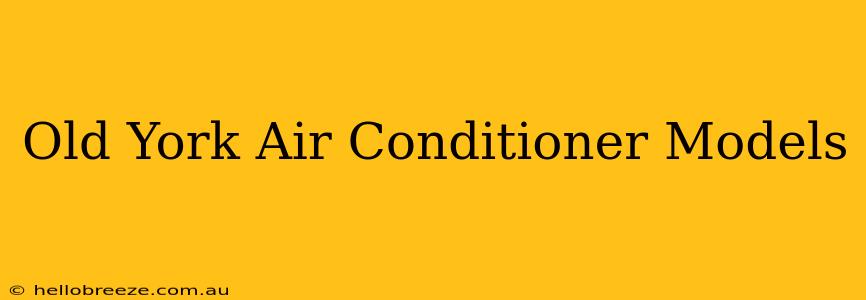Finding parts and information for older York air conditioner models can be a challenge, but it's not impossible. This guide will walk you through the process of identifying your old York AC unit, troubleshooting common issues, locating replacement parts, and even considering an upgrade.
Identifying Your Old York Air Conditioner Model
The first step is to locate your air conditioner's model number. This crucial piece of information is usually found on a sticker located on the unit itself. It's often found on the side or top of the indoor unit (the evaporator coil) and the outside unit (the condenser). The model number is usually a combination of letters and numbers, for example, YXXXXXXX. Write this number down; you'll need it for all subsequent steps.
Where to Find the Model Number
- Indoor Unit: Check the sides, top, and back of the indoor unit. Look for a sticker or metal plate with the information.
- Outdoor Unit: The outdoor unit will also have a sticker with the model and serial number.
- Owner's Manual: If you still have the owner's manual, the model number will be clearly printed on the cover or inside the first few pages.
Troubleshooting Common Problems with Older York AC Units
Once you have the model number, you can start troubleshooting. Some common issues with older York air conditioners include:
- Refrigerant Leaks: Older units are more susceptible to refrigerant leaks. This often manifests as weak cooling or no cooling at all. Warning: Refrigerant handling requires specialized knowledge and equipment. Never attempt to recharge or repair a refrigerant leak yourself. Always call a qualified HVAC technician.
- Compressor Failure: The compressor is the heart of your AC unit. If it fails, the unit will likely not function at all. Replacing a compressor is a significant repair and may not be cost-effective for an older unit.
- Electrical Problems: Issues with wiring, capacitors, or the control board can prevent the unit from starting or operating correctly.
- Blower Motor Problems: The blower motor circulates air through the system. A faulty motor can lead to weak airflow or no airflow at all.
- Dirty Air Filter: A clogged air filter restricts airflow and reduces efficiency. Regular filter changes are crucial for any AC unit, old or new.
Common Signs of Trouble
- Weak or No Cooling: This could indicate a variety of problems, from refrigerant leaks to compressor failure.
- Unusual Noises: Loud banging, rattling, or squealing sounds are usually a sign of a problem.
- Frequent Cycling: The unit turns on and off excessively, possibly due to a dirty filter or electrical issues.
- Frozen Evaporator Coil: Ice buildup on the indoor coil could be caused by low refrigerant, restricted airflow, or a faulty defrost cycle.
Finding Replacement Parts for Older York Air Conditioners
Locating parts for older models can be more difficult. Here's where you can start your search:
- York's Website: While finding exact parts for very old models might be tricky, York's website may offer some resources or contact information for finding authorized dealers.
- Authorized Dealers: Contacting local HVAC contractors who are authorized York dealers is a great way to find parts or get a repair quote. They often have access to a wider range of parts, including those for discontinued models.
- Online Parts Suppliers: Several online retailers specialize in HVAC parts, including those for older units. Be sure to use your model number when searching.
- Scrap Yards or Salvage Dealers: A last resort might be contacting scrap yards or salvage dealers specializing in HVAC equipment. They may have parts from older York units available.
Considering a Replacement
Repairing an older York air conditioner can become increasingly expensive, especially if multiple components need replacing. If the repair costs approach the price of a new, energy-efficient unit, replacing your old air conditioner might be the most cost-effective solution in the long run. A new unit will offer improved energy efficiency, potentially saving you money on your energy bills.
Remember always consult with a qualified HVAC professional for any repairs or installations involving your air conditioning system. Safety and proper function are paramount.

